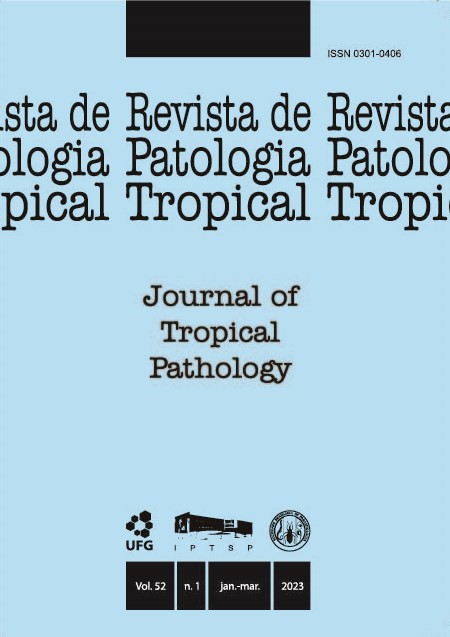Prevalence of intestinal parasites in a clinical analysis laboratory in southern Brazil: a retrospective study
DOI:
https://doi.org/10.5216/rpt.v52i1.73347Abstract
The population’s living conditions, basic sanitation, hygiene, and poor socioeconomic status, are determining factors for diseases´ transmission, such as intestinal parasitic infections which constitute one of the main public health problems in Brazil. These diseases are considered endemic in several areas of the country, presenting a wide geographic distribution, varying according to environmental conditions and parasites´ species. Therefore, the present study aimed to evaluate the prevalence of intestinal parasites in individuals attending a clinical analysis laboratory in a municipality located in Southern of Brazil. A retrospective study was carried out through the analysis of 2,247 reports of parasitological stool examination from individuals who attended a clinical analysis laboratory located in Veranópolis, Rio Grande do Sul, from September 1st, 2018, to December 31st, 2020. Parasitic structures were found in stool samples from 181 (8.1%) individuals. The protozoans Endolimax nana and Entamoeba coli were the most prevalent parasites, being present in 58.0% and 29.8% of individuals, respectively. A higher prevalence of intestinal parasites was observed in women (52.5%), aged 21 to 60 years old (62.4%). Biparasitism or polyparasitism was present in 7.2% (13/181) of individuals and only 31.7% (713/2247) of samples collected three fecal samples for examination. The low prevalence of intestinal parasites found in the present study may be an indicator of improvements in sanitary, environmental, and health education conditions.
KEY WORDS: Parasitic diseases; helminths; parasites; protozoans.
Downloads
Downloads
Published
How to Cite
Issue
Section
License
The manuscript submission must be accompanied by a letter signed by all authors stating the full name and email address, confirming that the material has not been published or is under consideration for publication elsewhere, and agreeing to transfer copyright in all media and formats for Journal of Tropical Pathology. The authors will not be paid for published articles. They are solely responsible for the content of those articles, even if the Editor holds the right to adjust them to the norms of the journal.
The reviewers will not be paid for the peer review process.

